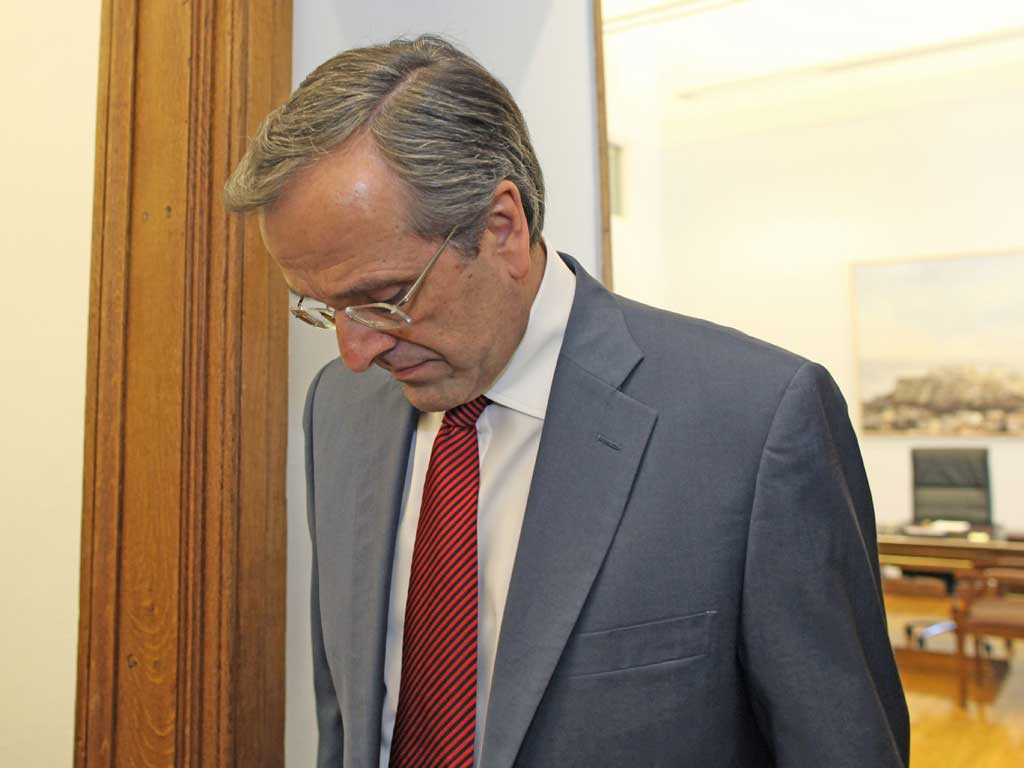Your support helps us to tell the story
From reproductive rights to climate change to Big Tech, The Independent is on the ground when the story is developing. Whether it's investigating the financials of Elon Musk's pro-Trump PAC or producing our latest documentary, 'The A Word', which shines a light on the American women fighting for reproductive rights, we know how important it is to parse out the facts from the messaging.
At such a critical moment in US history, we need reporters on the ground. Your donation allows us to keep sending journalists to speak to both sides of the story.
The Independent is trusted by Americans across the entire political spectrum. And unlike many other quality news outlets, we choose not to lock Americans out of our reporting and analysis with paywalls. We believe quality journalism should be available to everyone, paid for by those who can afford it.
Your support makes all the difference.Greece's prime minister has insisted ahead of a visit to Germany that Athens does not want more money from creditors, but indicated it would like more time to enact reforms and spending cuts.
Antonis Samaras pledged before coming to power to seek a two-year extension to the deadline for implementing unpopular cuts demanded in exchange for international aid.
But creditors such as Germany are reluctant to grant significant concessions.
Mr Samaras will meet German Chancellor Angela Merkel on Friday. He was quoted as telling the Bild daily: "We are not asking for extra money."
He added: "All we want is a little 'air to breathe' to get the economy going and increase state income."
Mr Samaras said that "more time does not automatically mean more money". He did not give a timeframe.
Mr Samaras vehemently rejected the suggestion that it might be better for Greece to leave the 17-nation euro and bring back its former currency, the drachma.
That, he told the Bild, would result in "a catastrophe for Greece" and economic collapse.
Mr Samaras pledged before coming to power to seek a two-year extension to the deadline for implementing unpopular cuts demanded in exchange for two massive international aid packages worth 240 billion euro (£189 billion) that are keeping Greece afloat.
But delays in implementing reforms and austerity measures have fuelled impatience in Germany - the largest single contributor to the bailouts - and other eurozone countries.
German officials have made clear they are in no mood to grant significant concessions, and speculation has grown that Greece will have to leave the euro.
Luxembourg's prime minister Jean-Claude Juncker, who chairs the eurozone finance ministers' meetings, is due in Athens today. Later, Mr Samaras will head to Berlin and Paris on Friday and Saturday for talks with German chancellor Angela Merkel and French president Francois Hollande.
Those meetings come ahead of an assessment of Greece's efforts by inspectors from the so-called troika of the International Monetary Fund, European Union and European Central Bank.
Greece's debt stands at more than 300 billion euro (£236 billion), and its economy is struggling through a fifth year of recession with unemployment above 23%.
When asked whether Greece needs a second debt writedown following one carried through earlier this year, Mr Samaras replied: "That has never been discussed."
Some German politicians have talked openly in recent weeks about the possibility of Greece leaving the euro, and the vice chancellor, economy minister Philipp Roesler, has said that the idea of a Greek exit has "lost its horror".
But Athens insists the country must remain in the euro - something which opinion polls have shown the vast majority of Greeks want.
Asked by Bild whether a return to the drachma would be better, Mr Samaras replied that "the consequences would be a catastrophe for Greece".
"It would mean at least five more years of recession and push unemployment above 40%," he was quoted as saying. "A nightmare for Greece: economic collapse, social unrest and an unprecedented crisis of democracy."

Join our commenting forum
Join thought-provoking conversations, follow other Independent readers and see their replies
Comments